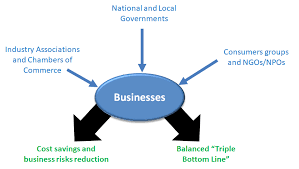Understanding Sustainable Business Practices
Sustainable business practices refer to the systematic approach that organizations adopt to operate in an economically, socially, and environmentally responsible manner. The principles of sustainability encompass three critical pillars: environmental stewardship, social responsibility, and economic viability. Each of these components plays a significant role in shaping a company’s operational framework and its long-term success in the marketplace.
Environmental stewardship emphasizes the importance of minimizing a company’s ecological footprint through resource conservation, waste reduction, and energy efficiency. Businesses are called to adopt practices such as using renewable energy sources, enhancing recycling programs, and reducing greenhouse gas emissions. This commitment to environmental protection not only benefits the planet but also positions the company as a responsible entity in the eyes of consumers and investors alike.
Social responsibility involves a company’s obligation to contribute positively to society. This may include fair labor practices, community engagement, philanthropy, and stakeholder inclusivity. By fostering a culture of ethical conduct and social equity, organizations can enhance their reputation and build strong relationships with stakeholders. In addition, socially responsible companies often attract customers who share similar values, leading to increased brand loyalty.
Economic viability is essential as it ensures that the sustainable practices adopted by a business are not financially burdensome. Organizations must find a balance between cost-effectiveness and sustainability, demonstrating that it is possible to achieve profitability while adhering to sustainable principles. In today’s market, the global emphasis on sustainability has increased, pushing companies to integrate these practices into their core strategies rather than treating them as ancillary activities. This shift not only enhances the company’s image but also aligns it with emerging trends that prioritize sustainable business operations.
The Impact of Sustainability on Company Reputation
Sustainable business practices have increasingly become a crucial element in shaping a company’s reputation, especially among investors and stakeholders. The connection between sustainability efforts and public perception is well-documented, with numerous studies indicating that consumers and communities favor businesses demonstrating a commitment to environmental and social responsibility. When a company adopts sustainable practices, it not only shows a commitment to ethical considerations but also enhances its overall brand image in the eyes of the public.
Research indicates that organizations which incorporate sustainability into their core operations often enjoy a stronger reputation. A survey conducted by Cone Communications reported that 87% of consumers would purchase a product based on a company’s stance on social and environmental issues. This statistic emphasizes the growing trend of consumers increasingly seeking out brands that prioritize environmental stewardship. Furthermore, companies viewed as sustainable are often able to cultivate a loyal customer base, as consumers develop trust in brands that actively contribute to societal well-being.
The implications for brand loyalty are profound. Customers are more likely to remain loyal to brands perceived as responsible and sustainable. For instance, a study by Nielsen showed that 66% of global respondents would pay more for sustainable brands, aligning their purchasing decisions with their values. This phenomenon highlights the crucial role of sustainability in not only attracting new customers but also retaining existing ones, as customers grow emotionally attached to brands that reflect their personal ethics.
Additionally, stakeholder expectations have evolved, now encompassing sustainability as a key evaluative criterion. Investors are increasingly scrutinizing companies’ environmental and social governance (ESG) criteria before committing their resources. A positive reputation garnered through sustainability can translate into financial benefits, as investors are inclined to support businesses that align with socially responsible investing principles. Hence, sustainability is not merely an ethical choice but a strategic imperative that ultimately enhances company reputation and fosters trust among all stakeholders.
Investor Expectations and Sustainable Practices
In recent years, investors have begun to incorporate sustainability into their decision-making processes to a greater extent than ever before. This shift occurs in response to growing awareness of the substantial risks associated with environmental degradation, social inequality, and governance failures. As a result, many investors now actively seek out companies that prioritize sustainable business practices, viewing them as more resilient and forward-thinking. The emphasis on Environmental, Social, and Governance (ESG) criteria reflects a broader trend among the investment community towards responsible investing.
Investors increasingly expect companies to not only be profitable but also to demonstrate a commitment to sustainability. This includes implementing environmentally friendly practices, promoting social equity, and maintaining strong governance standards. Companies that align their operations with these values are often more attractive to investors, as they are perceived as being less likely to face regulatory penalties, reputational damage, or operational disruptions. Furthermore, firms that demonstrate robust sustainability initiatives can potentially achieve lower costs and higher efficiencies, thus appealing to the bottom-line considerations of investors.
The financial benefits for companies adopting sustainable practices are becoming more evident. Research indicates that businesses with strong sustainability credentials can often outperform their peers in the long term, leading to enhanced profitability and increased shareholder value. This strategic focus on sustainability helps create a competitive advantage, as it builds trust and improves the company’s reputation among both investors and stakeholders. Companies that are proactive in addressing sustainability issues can effectively attract investment capital, benefit from favorable financing terms, and establish a loyal customer base, ultimately enhancing their market position.
Case Studies of Successful Sustainable Businesses
The integration of sustainable business practices has become a pivotal strategy for companies aiming to boost their reputations among investors and stakeholders. Several organizations have exemplified successful sustainability initiatives that have positively impacted their public perception and financial performance. One notable example is Unilever, a consumer goods giant that has made significant strides in sustainability through its Sustainable Living Plan. Launched in 2010, this initiative focuses on reducing environmental impact while enhancing social benefits. Unilever has actively engaged in sourcing sustainable raw materials, reducing waste, and improving the health and well-being of communities. By committing to these strategies, the company has not only strengthened its brand reputation but also attracted conscious consumers and investors seeking ethically responsible partners.
Another compelling case is that of Patagonia, a leading outdoor clothing brand renowned for its dedication to environmental sustainability. The company’s “Don’t Buy This Jacket” campaign encouraged consumers to consider the environmental impact of clothing consumption. Patagonia has established a transparent supply chain, ensuring that its materials are sourced sustainably and ethically. The brand’s commitment to corporate social responsibility resonates deeply with eco-conscious consumers, thereby enhancing its reputation significantly. As a result, Patagonia has cultivated a loyal customer base and attracted investors interested in sustainable-oriented enterprises.
Additionally, Tesla has revolutionized the automotive industry with its focus on producing electric vehicles aimed at reducing carbon emissions. Despite facing challenges, such as production hurdles and market competition, Tesla’s commitment to innovation in clean energy has positioned it as a leader in sustainable transport. Its consistent efforts toward sustainability have bolstered the company’s image, making it a compelling option for investors prioritizing sustainability. These case studies exemplify how adopting sustainable practices not only addresses environmental and social concerns but also creates substantial value in reputation management.
The Role of Stakeholders in Promoting Sustainability
Stakeholders play a critical role in advancing sustainability within organizations. By definition, stakeholders encompass individuals or groups that have an interest in a company’s operations and decisions, including employees, customers, suppliers, investors, and the broader community. Their engagement is essential, as it fosters a mutual understanding and commitment to sustainable business practices. Each group possesses unique perspectives and insights that can significantly influence a company’s sustainability agenda.
Employees, for instance, are often the backbone of sustainability initiatives. Their involvement can generate innovative ideas for reducing waste, improving energy efficiency, and enhancing workplace practices. By actively promoting a culture of sustainability, employees can drive change from within, resulting in better corporate performance and increased resilience against environmental challenges. Furthermore, companies that engage their staff tend to see higher levels of job satisfaction and retention, creating a more committed workforce.
Customers also play a pivotal role in shaping a company’s sustainability efforts. As consumer preferences shift towards more environmentally conscious products and services, businesses are increasingly compelled to adapt to these trends. By listening to customer feedback and recognizing the importance of ethical sourcing, firms can enhance their product offerings, build brand loyalty, and ultimately improve their market positioning. Transparent communication regarding sustainability practices is vital in establishing trust and credibility with customers, enhancing overall engagement.
Additionally, suppliers and the community are integral stakeholders in the journey towards sustainability. Collaborating with suppliers to establish sustainable supply chains can not only reduce costs but also ensure compliance with environmental regulations. Meanwhile, engaging with local communities allows businesses to understand their concerns and contribute positively to social well-being. This approach not only supports sustainable development but also strengthens the social license to operate, ultimately fostering goodwill and a positive company reputation.
In essence, the collective involvement of stakeholders in promoting sustainability leads to shared benefits, aligning organizational goals with broader societal values. This collaboration ensures that sustainability is embraced as a fundamental principle, driving innovation and long-term success.
Challenges Companies Face in Implementing Sustainable Practices
The journey toward sustainable business practices is often fraught with challenges that can impede a company’s ability to implement effective strategies. One of the primary hurdles organizations face is financial constraints. Implementing sustainable solutions such as renewable energy sources, eco-friendly materials, or advanced waste management systems may require significant upfront investment. For many companies, especially small or medium enterprises, allocating capital toward sustainability can be perceived as a risk, potentially diverting resources from other critical operational areas.
Another considerable barrier is resistance to change within the organization. Employees and management may be accustomed to traditional business operations, leading to reluctance in adopting new sustainable practices. This often stems from a lack of awareness or understanding of the long-term benefits associated with sustainability. Overcoming this resistance necessitates a robust change management approach, where effective communication about the advantages and necessity of sustainability is essential to foster an organizational culture that embraces eco-friendly initiatives.
Additionally, many companies encounter challenges related to insufficient knowledge and expertise in sustainable practices. This gap can result in inadequate planning and execution of sustainability strategies. To address this, organizations must invest in training programs that equip employees with the necessary skills and understanding of sustainability. Furthermore, leveraging partnerships with sustainability consultants can provide valuable insights and frameworks that enhance the implementation process.
Finally, the rapid advancement of technology presents a dual challenge; while it provides innovative solutions for sustainability, it can also render existing technologies obsolete. Companies must stay abreast of technological trends to ensure they are utilizing the most effective tools available. By embracing continuous learning and adaptation, companies can overcome these challenges. Equipped with strategic recommendations and a thorough understanding of barriers, organizations can effectively navigate the path to adopting sustainable business practices that not only enhance their reputation among investors and stakeholders but also contribute to long-term organizational success.
Measuring the Impact of Sustainability on Reputation
In today’s business landscape, the assessment of sustainability practices and their influence on a company’s reputation is increasingly important. Numerous metrics and tools can be employed to evaluate this impact effectively. Surveys, for instance, offer valuable insights into stakeholder perceptions regarding a company’s sustainability initiatives. By gathering feedback from employees, customers, investors, and the community, organizations can identify strengths and weaknesses in their sustainable practices. This data not only serves to understand stakeholder opinion but can also guide future strategies to bolster a company’s reputation.
Brand tracking is another crucial method that companies can utilize to measure the influence of sustainability on their reputation. Through the consistent monitoring of brand perception over time, businesses can assess how sustainability efforts resonate with their target audience. This could involve tracking key performance indicators (KPIs) such as brand loyalty, customer satisfaction, and overall brand equity. Improved brand metrics related to sustainability can signify a positive shift in company reputation, thereby appealing to more environmentally-conscious consumers and investors.
Social media analysis is also a vital avenue for businesses to assess the effectiveness of their sustainability initiatives. Platforms like Twitter, Facebook, and LinkedIn offer a wealth of information about public sentiment toward a company’s actions. By analyzing engagement metrics, sentiment analysis, and the volume of conversations surrounding sustainability-focused campaigns, organizations can gain a nuanced understanding of their reputation. Engaging with this data allows companies to adapt their strategies in response to feedback, ensuring that their sustainability practices are recognized and valued by stakeholders.
Ultimately, continuous assessment of sustainability practices is essential. The dynamic nature of public opinion necessitates that companies regularly review and adapt their strategies to maintain a positive reputation among investors and stakeholders. By employing a combination of surveys, brand tracking, and social media analysis, businesses can effectively gauge the impact of their sustainability efforts, fostering a reputation that resonates with their audience.
Future Trends in Sustainable Business Practices
The landscape of sustainable business practices is rapidly evolving, driven by various factors including technological advancements, increasing regulations, and shifting consumer expectations. These elements not only influence operational strategies but also significantly impact company reputation among investors and stakeholders. Businesses that proactively adopt these trends are likely to enhance their standing in the eyes of their stakeholders, thereby securing a competitive advantage.
Advancements in technology play a pivotal role in shaping sustainable business practices. Innovations such as artificial intelligence and blockchain are enabling organizations to streamline operations and promote transparency in supply chains. For instance, AI can optimize resource management, reducing waste and enhancing energy efficiency. Concurrently, blockchain technology can provide verifiable data regarding the sustainability of materials used in production, thus fostering trust with consumers and investors alike. As technology evolves, companies must stay abreast of these developments to effectively harness their benefits.
Alongside technological advancements, regulatory frameworks are becoming increasingly stringent. Governments worldwide are implementing new environmental regulations aimed at curbing carbon emissions and promoting sustainability. These regulations compel businesses to reassess their practices and integrate sustainable approaches into their core strategies. Companies that comply with or exceed these legal standards position themselves as leaders in sustainability, enhancing their reputations and attracting socially conscious investors.
Another crucial trend is the shift in consumer expectations. Today’s consumers are more informed and increasingly concerned about the environmental and social impact of their purchasing decisions. As a result, brands that demonstrate a commitment to sustainability through transparent practices and responsible sourcing experience heightened loyalty and engagement. Organizations must therefore remain agile, adapting their strategies to align with the evolving values and preferences of their customer base.
In conclusion, the future of sustainable business practices is poised for significant transformation. By leveraging technological advancements, adhering to regulatory shifts, and responding to changing consumer expectations, companies can not only enhance their operational efficiency but also bolster their reputations among investors and stakeholders. To remain competitive, businesses must anticipate these trends and adapt their strategies accordingly.
Conclusion: The Strategic Value of Sustainability for Reputation Management
In today’s rapidly evolving business landscape, the significance of sustainable business practices has never been more pronounced. Companies that prioritize sustainability not only contribute positively to the environment and society but also enhance their reputation among investors and stakeholders. Research consistently shows that businesses adopting sustainable practices can experience increased customer loyalty, improved brand perception, and ultimately, stronger financial performance. This interrelation underscores the strategic value of integrating sustainability into core business operations.
Investors are increasingly looking at sustainability metrics as critical indicators of a company’s long-term viability. Sustainable practices are often reflective of good governance and risk management strategies, which can attract socially conscious investors and improve access to capital. Furthermore, stakeholders, including employees, customers, and community members, gravitate toward companies that demonstrate a commitment to ethical practices, which can lead to a more engaged workforce and enhanced public perception.
It is imperative for businesses to transition from viewing sustainability as a mere trend to recognizing it as a strategic imperative integral to their long-term success. This shift requires a thorough understanding of the company’s social and environmental impact and the implementation of actionable strategies. By fostering a culture of sustainability, companies can position themselves not just as market players but as leaders in their respective industries. This commitment can strengthen corporate reputation, build trust, and create shared value for all stakeholders.
In conclusion, the robust linkage between sustainable business practices and reputation management serves as a compelling argument for businesses to embrace sustainability wholeheartedly. Those companies that recognize this relationship and act upon it are likely to enjoy the rewards of enhanced stakeholder engagement and a strong market presence in the years to come.
How useful was this post?
Click on a star to rate it!
Average rating 0 / 5. Vote count: 0
No votes so far! Be the first to rate this post.









